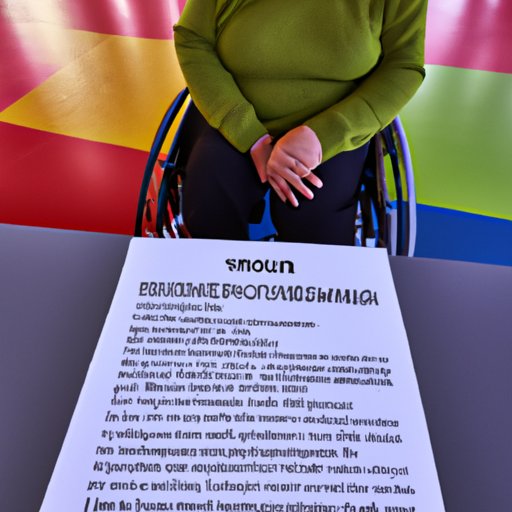Introduction
Disability is a physical or mental impairment that substantially limits one or more major life activities. According to the Americans with Disabilities Act (ADA), individuals with disabilities are protected from discrimination in employment, education, public services, and other settings. This article provides a comprehensive guide on how to get disability, including understanding your rights under the ADA, knowing the criteria for qualifying for disability benefits, obtaining a medical diagnosis of your disability, gathering evidence to support your disability claim, submitting an application for disability benefits, attending a disability hearing, and appealing if necessary.
Understand Your Rights Under the ADA
The ADA states that employers must provide reasonable accommodations to employees with disabilities so that they can perform the essential functions of their job. Employers must also make sure that their workplace is accessible to people with disabilities. In addition, employers may not discriminate against applicants or employees because of their disability.
To be eligible for protection under the ADA, you must have a physical or mental impairment that substantially limits one or more major life activities. You must also have a record of such an impairment, or be regarded as having such an impairment.
In addition to protection from discrimination, the ADA also guarantees certain accommodations and other rights for individuals with disabilities. These include the right to request reasonable accommodations, the right to use service animals in the workplace, and the right to access information in an accessible format.
Know the Criteria for Qualifying for Disability Benefits
In order to qualify for Social Security disability benefits, you must meet certain criteria. First, you must have a medically determinable physical or mental impairment that is expected to last at least 12 months or result in death. This impairment must also prevent you from doing any substantial gainful activity. The Social Security Administration (SSA) will evaluate your functional limitations to determine whether or not you meet this criterion.
In addition, the SSA will assess the duration of your disability. Generally, you must have had the disability for at least five full months before you can apply for disability benefits. The SSA may also consider your age, education, work experience, and transferable skills when determining eligibility for disability benefits.

Obtain a Medical Diagnosis of Your Disability
Before applying for disability benefits, you must obtain a medical diagnosis of your disability. You should consult a doctor who specializes in your particular condition or impairment. Depending on your condition, you may need to see a neurologist, orthopedist, psychiatrist, psychologist, or other specialist.
Your doctor will likely perform tests and ask questions about your symptoms in order to make a diagnosis. They may also ask for records of prior treatments, surgeries, and hospitalizations. Be sure to keep all of your medical records and documentation in one place and bring them to your appointment.

Gather Evidence to Support Your Disability Claim
When applying for disability benefits, you must provide evidence to support your claim. This evidence should include medical records, employment history, and education records. Your medical records should clearly document your diagnosis, symptoms, treatments, and other relevant information. It is important to keep copies of all of your medical records and test results.
You should also provide evidence of your employment history and education records. This includes resumes, job applications, performance reviews, and transcripts. These documents will help the SSA determine your ability to perform certain jobs.

Submit an Application for Disability Benefits
Once you have gathered all of the necessary evidence, you can begin the process of applying for disability benefits. To do so, you must fill out several forms and provide supporting documentation. The forms you need to complete depend on the type of disability benefits you are applying for. The most common forms are the Adult Disability Report, the Child Disability Report, and the Work History Report.
In addition to the forms, you must also provide supporting documentation such as medical records, employment history, and education records. You should also provide a list of medications, treatments, and therapies you have received for your disability.
Attend a Disability Hearing
If your application for disability benefits is denied, you may be required to attend a disability hearing. At the hearing, an administrative law judge will review your case and ask questions about your disability. It is important to prepare for the hearing by gathering all of your evidence, including medical records, employment history, and education records.
At the hearing, the judge may ask questions about your symptoms, treatments, and functional limitations. They may also ask questions about your work history and education. Be sure to answer all questions honestly and provide detailed answers.
Appeal if Necessary
If your claim for disability benefits is denied after the hearing, you can file an appeal. You may appeal if you believe the decision was incorrect or if new evidence has been discovered. When filing an appeal, you must provide detailed reasons why you believe the decision was wrong. You may also need to submit additional evidence to support your claim.
The appeals process can be lengthy and complex, so it is important to understand the steps involved. It is also important to seek legal advice if you are considering filing an appeal. An experienced attorney can help you navigate the appeals process and ensure that your rights are protected.
Conclusion
Getting disability benefits can be a long and difficult process. However, it is important to understand your rights under the ADA and know the criteria for qualifying for disability benefits. You must also obtain a medical diagnosis of your disability, gather evidence to support your claim, submit an application for disability benefits, attend a disability hearing, and appeal if necessary. By following these steps, you can increase your chances of being approved for disability benefits.
If you need more information or assistance with applying for disability benefits, contact your local Social Security office or visit the SSA website. You can also speak with an experienced attorney who can help you understand your rights and guide you through the process.
(Note: Is this article not meeting your expectations? Do you have knowledge or insights to share? Unlock new opportunities and expand your reach by joining our authors team. Click Registration to join us and share your expertise with our readers.)
